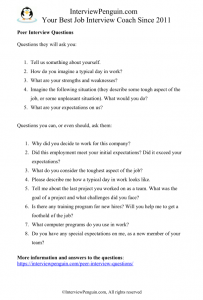Peer interview is a final step of a hiring process for jobs in which teamwork, and good chemistry between team members, is essential. You’ve been already approved by the HR manager, by your future superior, and now your prospective colleagues from a team should approve you. Few things you should realize before you start preparing for this interview:
- The people you will meet are not professional interviewers. Do not expect to get any tough behavioral questions. However, if you apply for a highly technical job (engineering, programming), you may get some fairly technical questions from your future team members.
- The impression you make matters the most. Can they imagine sharing an office with you? Do they feel comfortable talking to you? Are you trustworthy?
- You can ask as many questions as you want, and you should also make a decision. Do you feel good about the people? Are they qualified for their job? Would you enjoy sharing the workplace with them?
Table of Contents
Non-verbal communication and listening
First and foremost, you should set your mind the right way. You should think nicely about the people you will meet, and you should believe that you will succeed in this interview.
The way you think will reflect in your gestures, and the way you behave in an interview (check more in body language in an interview).
Another crucial factor for your success are your listening abilities. While people differ in many ways, we have a few things in common. Everyone likes when other people listen to them, when they are honestly interested in their words, in their needs and desires, in their opinions.
Try to benefit from this in your interview. Ask questions, be interested in your future peers, and carefully listen to their stories. That is the foundation stone of your success in a peer interview.
Questions they will ask you
They will ask you mostly basic question, and your personal life and hobbies may interest them even more than your professional experience. After all you’ve been already approved by other people from the company, so there is no need to doubt your readiness for the job. Let’s have a look at some questions.
Tell us something about yourself.
Tell them how old you are, where you come from, the school you attended (the highest level of education), the last job you had, and what made you apply for the job.
You should also mention something from your personal life: whether you’re single or married, what you like to do in your free time, etc. The key is to be open right from the start, not hiding anything.
How do you imagine a typical day in work?
Try to emphasize teamwork in your answer. What is more, you should show them that you like to be busy, and do not expect an easy ride.
You should also name some duties from the job description. In a perfect scenario you will add a question at the end of your answer, asking them whether you are right, whether your idea of the day in work reflects the reality as they experience it day in day out in work.
What are your strengths and weaknesses?
This is a question all people remember from their interviews (or from their preparation, because it is not as common as it used to be one day), and for this reason they will often use it when interviewing their future colleagues.
Try to be honest with them, and pick at least one weakness, ideally such that is not central for the job. The key is to humble yourself, to show some weaknesses, to show that you are just a human being, and have both strengths and weaknesses–just like them. Do not play a super-hero. People do not like that…
* To see good answers for particular job titles, have a look at Weakness interview question article.
Imagine the following situation (they describe some tough aspect of the job, or some unpleasant situation). What would you do?
This is a test of your attitude, and of your readiness for the job (whether you even count with this or that situation). Typically they will narrate a situation that requires some teamwork, and you should suggest a good solution to it. What is more, you should say that you count with experiencing this situation, and are not discouraged by the idea.
But even if the situation is totally foreign to you, and you have no idea what you would do (or should do) in a given scenario, you can still give them a good answer. Say humbly that you do not know what you would do, but are ready to help your more experienced team members, and would follow any instructions they’d give you.
What are your expectations on us?
This is a tricky question. In most other interviews I would suggest saying that you have no expectations (and focus mostly on your own job), but in a peer interview everything is about teamwork, and you probably should expect something from your new colleagues (it would sound awkward if you said that you expected nothing).
Perhaps you can say that you hope to get initial guidance and support from them, to help you get a good grasp of the job. You can also say that you hope for clear and honest communication in the team, and that they will give you regular feedback to help you to do better…
Special Tip: You can also download the full list of questions in a one page long PDF, and practice your interview answers anytime later:

Questions you should ask in a peer interview
In a best possible scenario, you let them do the talking in a peer interview. You show interest with right questions (in both the job and the people who interview you), and then carefully listen and ask follow-up questions. This strategy will work in most peer interviews, and below you fill find some questions you can ask your future colleagues:
- Why did you decide to work for this company?
- Did this employment meet your initial expectations? Did it exceed your expectations?
- What do you consider the toughest aspect of the job?
- Please describe me how a typical day in work looks like.
- Tell me about the last project you worked on as a team. What was the goal of a project and what challenges did you face?
- Is there any training program for new hires? Will you help me to get a foothold of the job?
- What computer programs do you use in work?
- Do you have any special expectations on me, as a new member of your team?
Summary and next steps
Unless you are particularly introverted, peer interview won’t be difficult. Just be human, ask questions, and listen carefully to the answers of your future colleagues. Show them that it is a pleasure to have you in an office, that you are genuinely interested in both the job and in your new colleagues.
At the end of the day, do not forget that you are also making a decision. If you can not imagine working with people you meet in a peer interview (for whatever reason), you should not accept the job offer… Prepare for the questions, prepare your own questions, and enjoy the experience. I am sure you will do well, and wish you good luck!
May also interest you:
- Informational interview – Get information about the employer, and benefit from them in an actual interview.
- Exit interview questions.
- Behavioral interview questions and answers.


